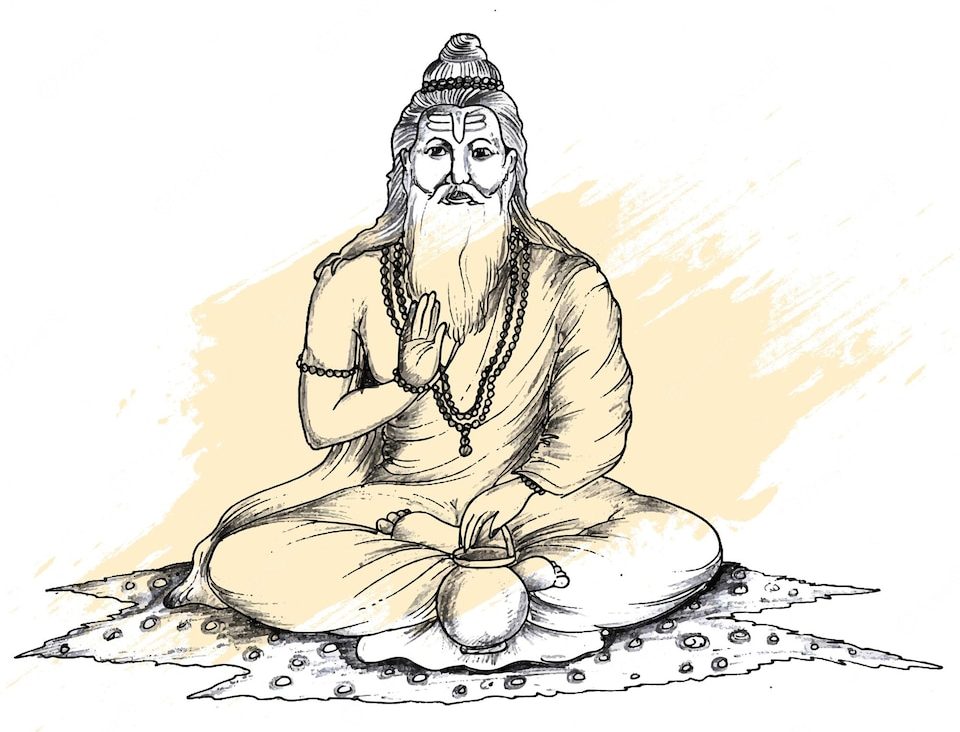
Maharishi Jaimini
The Visionary Sage and Authority on Mimamsa Philosophy
Introduction:
Maharishi Jaimini is an esteemed sage from ancient India, renowned for his deep philosophical insights and his significant contributions to Hindu culture, particularly in the field of Mimamsa philosophy. His profound understanding of Vedic scriptures and meticulous analysis of rituals have had a lasting impact on Hindu philosophy and the interpretation of sacred texts. In this article, we will explore the details of his early life and education, his career as a sage and teacher, his relationship with the gods, his disciples, his contributions to Hindu culture, his legacy, an overview of his contribution in Hinduism, books associated with him, and a conclusion summarizing his significance.
Early Life and Education:
The early life and exact details of Maharishi Jaimini’s birth and upbringing are not explicitly mentioned in the scriptures. However, it is believed that he was born into a Brahmin family and received a comprehensive education in the Vedic scriptures, rituals, and philosophical traditions of ancient India. Maharishi Jaimini’s upbringing and education laid the foundation for his future contributions as a sage and philosopher.
Career as a Sage and Teacher:
Maharishi Jaimini’s career as a sage and teacher was marked by his mastery of the Mimamsa philosophy. He dedicated his life to the interpretation and analysis of the Vedic scriptures, particularly the Brahmanas and the Aranyakas. Maharishi Jaimini’s meticulous approach to studying rituals, sacrifices, and scriptural injunctions resulted in the formulation of the Mimamsa Sutras, a comprehensive treatise on the principles and interpretation of Vedic rituals. His work not only provided valuable insights into the ritualistic aspects of Hinduism but also influenced subsequent philosophical and theological developments.
Relationship with Gods:
While specific details about Maharishi Jaimini’s relationship with the gods are not prominently mentioned in the scriptures, his teachings and philosophical insights reflect a deep reverence for the divine. His work primarily focuses on the interpretation of sacred texts and rituals rather than direct interactions with deities. Maharishi Jaimini’s approach to spirituality emphasizes the importance of adhering to scriptural injunctions and performing rituals with utmost sincerity and devotion.
Other Disciples:
Maharishi Jaimini had several disciples who studied under his guidance and further disseminated his teachings. Some of his notable disciples include Shamshapaayana, author of the Shatapatha Brahmana, and Badarayana Vyasa, the author of the Brahma Sutras. These disciples played a significant role in preserving and expanding upon Maharishi Jaimini’s philosophical insights and contributed to the development of various branches of Hindu philosophy.
Contributions to Hindu Culture:
Maharishi Jaimini’s most significant contribution to Hindu culture lies in the field of Mimamsa philosophy. His work, the Mimamsa Sutras, is a comprehensive and systematic exposition of the principles of interpretation and analysis of Vedic rituals and injunctions. The Mimamsa Sutras continue to be a vital text for scholars and practitioners, offering valuable guidance on understanding the ritualistic aspects of Hinduism and upholding the sanctity of Vedic traditions.
Legacy:
Maharishi Jaimini’s legacy lies in his profound impact on Hindu philosophy and the preservation of Vedic traditions. His meticulous approach to the interpretation of sacred texts has shaped the Mimamsa school of thought and influenced the theological and philosophical discourse within Hinduism. Maharishi Jaimini’s teachings continue to be studied and revered by scholars, philosophers, and practitioners, providing a framework for understanding the intricate rituals and scriptural injunctions of Hinduism.
Books Written by Him:
The most notable work associated with Maharishi Jaimini is the Mimamsa Sutras. This text comprises aphorisms that expound on the principles and interpretation of Vedic rituals and injunctions. The Mimamsa Sutras serve as a foundational text for the Mimamsa school of thought and are considered essential for the study of Hindu rituals and their philosophical underpinnings.
Conclusion:
Maharishi Jaimini, the visionary sage and authority on Mimamsa philosophy, played a crucial role in the interpretation and preservation of Vedic rituals and scriptural injunctions. His profound insights and meticulous analysis continue to shape Hindu philosophy and guide practitioners in their understanding of the ritualistic aspects of Hinduism. Maharishi Jaimini’s contributions to Hindu culture have left an indelible mark, inspiring generations to delve deeper into the scriptural wisdom and uphold the sanctity of Vedic traditions. His teachings remind us of the importance of studying and interpreting the sacred texts with reverence and adherence to the principles of Mimamsa philosophy.
Editor – Kaalchakra Team
[ Note – Before Concluding anything as a Finale, Please Go through Original Scriptures of Vaidik Literature Written in Sanskrit and Also with Meaning of That time of Language. Because English is a Limited language to Explaining the Deeper Knowledge of Vaidik Kaal. ]
